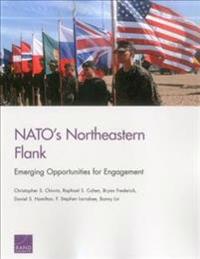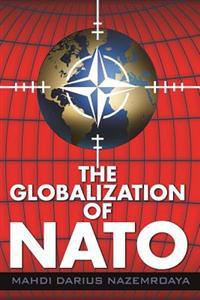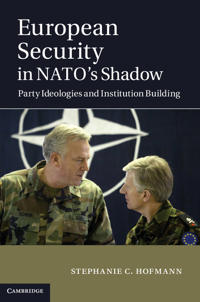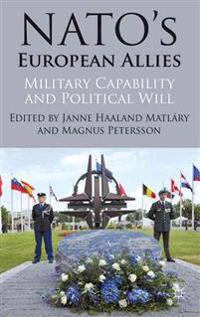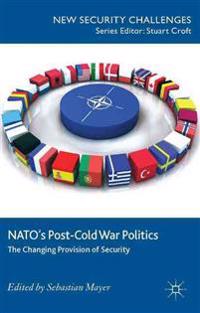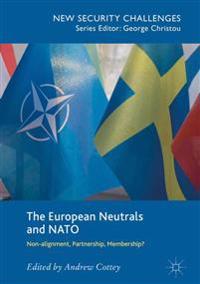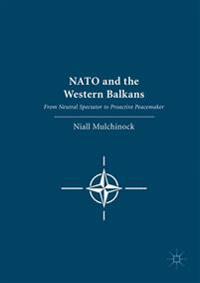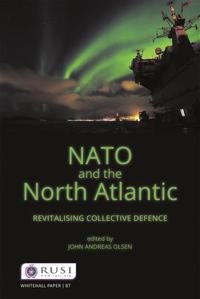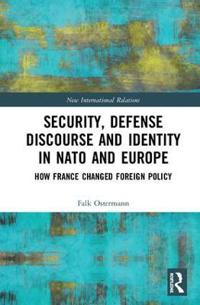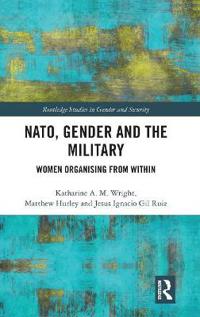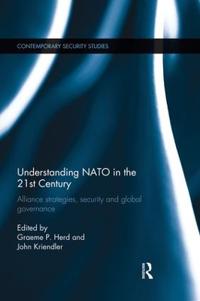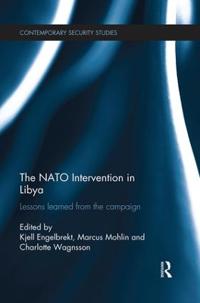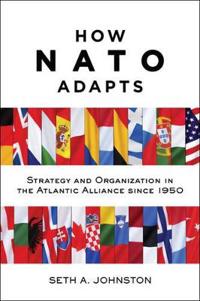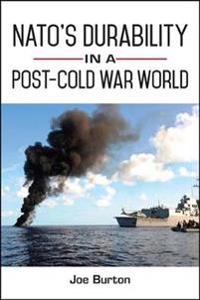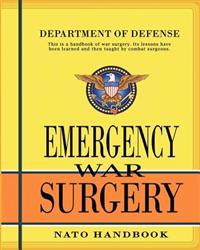NATO's Northeastern Flank (häftad)
ISBN: 9780833094643 - UTGIVEN: 2017-08This report examines the impact of renewed tension between NATO and Russia on key allies and partners in central and northeastern Europe. The objective is to identify how changes in the interests, security strategies, and defense capabilities of these countries affect U.S. partnering in the region, [...]
NATO's Transformation (Inbunden)
ISBN: 9780847683864 - UTGIVEN: 1996-12This timely volume assesses NATO's current accomplishments, continuing challenges, and potential pitfalls. Leading international scholars and policymakers explore three key themes influencing NATO's future: transatlantic relations, the debate over enlargement, and the organization's new functions. [...]
Global NATO and the Catastrophic Failure in Libya (Häftad)
avHorace Campbell
ISBN: 9780857491336 - UTGIVEN: 2013-09The Globalization of Nato (Häftad)
avMahdi Darius Nazamroaya
ISBN: 9780985271022 - UTGIVEN: 201208The world is enveloped in a blanket of perpetual conflict. Invasions, occupation, illicit sanctions, and regime change have become currencies and orders of the day. One organization - North Atlantic Treaty Organization (NATO) - is repeatedly, and very controversially, involved in some form or anothe[...]
European Security in NATO's Shadow (Inbunden)
avStephanie C. Hofmann
ISBN: 9781107029095 - UTGIVEN: 201302NATO has been a successful forum for managing European security policy. Yet European governments have repeatedly tried to build a new security institution in NATO's shadow. In this innovative book, Stephanie C. Hofmann asks why governments attempted to create an additional institution despite no obv[...]
NATO's European Allies (Inbunden)
ISBN: 9781137034991 - UTGIVEN: 201301The question of burden sharing has always been important for NATO, but this holds acute relevance today as the US cuts its defence budget over a ten-year period and is no longer willing to lead military operations. In a current situation of economic austerity and postmodern political values, this bo[...]
Meeting the Language Challenges of NATO Operations
ISBN: 9781137312556 - UTGIVEN: 2014-12After 40 years of Cold War, NATO found itself intervening in Bosnia-Herzegovina, Kosovo and Afghanistan, where the ability to communicate with local people was essential to the success of the missions. This book explains how the Alliance responded to this challenge so as to ensure that the missions [...]
NATO's post-Cold War Politics (Inbunden)
avSebastian Mayer
ISBN: 9781137330291 - UTGIVEN: 2014-08This collection portrays NATO's post-Cold War bureaucracy, decision-shaping and -making at Brussels Headquarters, identifies changes therein and evaluates their implications for the pursuit of external security with accompanying shifts in the locus of governance. It does so using the analytical conc[...]
The European Neutrals and NATO
ISBN: 9781137595232 - UTGIVEN: 2018-01This book provides the first detailed comparative analysis of the unusual partnership between the main European neutral states and NATO. Neutrality and alliance membership are fundamentally incompatible, but through the vehicle of NATO's post-Cold War partnerships the European neutral states and NAT[...]
NATO and the Western Balkans
ISBN: 9781137597236 - UTGIVEN: 2017-04This book provides a critical examination of NATO's evolving strategic and operational roles in the Western Balkans since the disintegration of Yugoslavia in 1991, with a particular focus on Bosnia, Kosovo and the former Yugoslav Republic of Macedonia, in both the conflict and post-conflict phases. [...]
NATO and the North Atlantic
ISBN: 9781138079618 - UTGIVEN: 2017-03The book analyses the renewed importance of the North Atlantic for NATO in the face of new security challenges This Whitehall Paper explores the renewed importance of the North Atlantic Ocean to NATO's security through the lenses of the United States, United Kingdom and Norway in particular. These t[...]
Security, Defense Discourse and Identity in NATO and Europe
ISBN: 9781138585409 - UTGIVEN: 2018-08Analyzing changes in the role and place of NATO, European integration, and Franco-American relations in foreign policy discourse under Presidents Jacques Chirac and Nicolas Sarkozy, this book provides an original perspective on French foreign policy and its identity construction. The book employs a [...]
NATO, Gender and the Military
ISBN: 9781138593336 - UTGIVEN: 2019-05This book examines NATO's engagement with gender issues through its military structures.Drawing on newly declassified NATO documents, this volume provides the first comprehensive account of NATO's long-established engagement with gender issues. These documents bring to the fore the stories of the NA[...]
Nato's First Enlargement
ISBN: 9781138681446 - UTGIVEN: 2016-06This volume discusses the entry of Greece and Turkey to NATO in 1952 from the perspective of history and international relations. The chapters were originally collected in 2012 to mark the occasion of the sixtieth anniversary of the accession of the two states to NATO. The focus is not on the diplom[...]
NATO's Security Discourse After the Cold War (Häftad)
avAndreas Behnke
ISBN: 9781138811768 - UTGIVEN: 2014-06This book analyses the way in which the North Atlantic Treaty Organisation (NATO) defines the West after the end of the Cold War and the demise of its constitutive 'Other', the Soviet Union. The book offers a theoretical critique of liberal approaches to security, and focuses on NATO's construction[...]
Understanding NATO in the 21st Century (Häftad)
ISBN: 9781138831889 - UTGIVEN: 2014-10Understanding NATO in the 21st Century enhances existing strategic debates and clarifies thinking as to the direction and scope of NATO's potential evolution in the 21st century. The book seeks to identify the possible contours and trade-offs embedded within a potential third "Transatlantic Bargain"[...]
The NATO Intervention in Libya (Pocket)
avKjell (EDT) Engelbrekt, Marcus (EDT) Mohlin, Charlotte (EDT) Wagnsson
ISBN: 9781138922686 - UTGIVEN: 2015-06This book explores 'lessons learned' from the military intervention in Libya by examining key aspects of the 2011 NATO campaign. NATO's intervention in Libya had unique features, rendering it unlikely to serve as a model for action in other situations. There was an explicit UN Security Council manda[...]
NATO
ISBN: 9781349219933 - UTGIVEN: 2014-01Can NATO survive? The stimulating and highly original essays contained in this volume provide important new insights into why the treaty organization was formed, how it developed, and what it has contributed both to the security and to the integration of Europe. The authors examine NATO as a strong [...]
How NATO Adapts (häftad)
ISBN: 9781421421988 - UTGIVEN: 2017-02Today's North Atlantic Treaty Organization, with nearly thirty members and a global reach, differs strikingly from the alliance of twelve created in 1949 to "keep the Americans in, the Russians out, and the Germans down." These differences are not simply the result of the Cold War's end, 9/11, or re[...]
Nato And Terrorism (Pocket)
avJames W. Peterson
ISBN: 9781441129765 - UTGIVEN: 2011-04-28Posits that the post 9/11 war on terrorism has had a profound effect on NATO's post Cold War structure and military missions. This book focuses on the decades from 1989 until 2009, during which NATO underwent two major transformations.[...]
Emergency War Surgery: NATO Handbook (Häftad)
avDepartment of Defense
ISBN: 9781463536060 - UTGIVEN: 2011-06NATO
ISBN: 9781498503709 - UTGIVEN: 2017-07The purpose of NATO: From Regional to Global Security Provider is to provide a comprehensive analysis of the Alliance's new vision (the new Strategic Concept) and common security impact - associated tasks to be undertaken within a short and longer term time horizon. The book serves as a relevant and[...]

